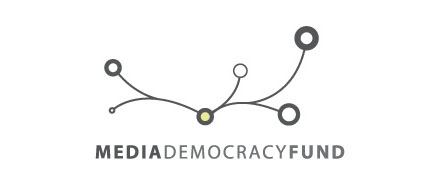The Media Democracy Fund (MDF) supports “media and technology policy organizations working to advance the public interest and human rights in the digital age.” It was founded in 2006 by Helen Brunner, who previously worked as a foundation consultant on freedom of expression, communications policy, and independent media.
“We don’t fund media directly,” an MDF staff member told CIMA, “rather we fund policies that have major impact on digital media.”
MDF is based in Washington, DC, where it is hosted by the New Venture Fund, a public charity established by leading philanthropists to launch and operate executive donor-driven public interest projects. The initial donations to set up MDF totaled $1,240,000.
MDF is one of the first philanthropies to be dedicated to the impact of policy decisions on the public’s right to communication in the digital age.

In the CIMA survey, each donor was asked to rate from high to low in terms of priority the types of media interventions it supports.
On its website, MDF lists “areas of particular interest” in its funding as including but not limited to:
In the last year, MDF has significantly increased its digital security work “in response to rising threats to civil society organizations,” an MDF staff member said.
MDF’s grant making is focused on “grassroots, national and international advocacy efforts that engage in organizing litigation, research, technology development, and legislative and regulatory reform to win victories that enhance communication and information access for all.”
To do this, MDF operates as a 501c3 and an affiliated 501c4 project – the Media Democracy Action Fund (MDAF). MDF/MDAF manages and funds campaigns to support an open Internet.
Since its inception in 2006, MDF has made over $25 million in grants.
A typical grant averages around $30,000, although project funding occasionally has run over $100,000.
Most of the Media Development Fund’s support goes to North America, in particular to organizations in the United States. Its 2016 regional breakdown was by percentage:
Africa 1 percent
Asia 3 percent
Europe 6 percent
Eurasia 3 percent
North America (US and Canada) 85 percent
Latin America 2 percent
MDF typically awards a docket of grants each summer. It also has a Rapid Response Fund to address sudden opportunities or threats throughout the year. To qualify for rapid response funding, applicants must show a unique and timely project requiring immediate support. Requests cannot be for organizational emergencies or ongoing projects typically eligible for the annual giving.
MDF also has set up issue-specific initiatives that make grants throughout the year: The Open Internet Defense Fund, Copyright Initiative, Surveillance Fund, and Global Initiatives.
MDF does not accept unsolicited proposals or phone inquires. Grants usually begin with a request from an MDF staff member, although the fund has a form at the bottom of its website that interested organizations can submit to gauge MDF’s potential interest. Particular attention is given to “Engaging new and underrepresented constituencies in policy debates and coordinating the strategies of existing groups and efforts are given particular emphasis,” MDF states on its website.
The MDF funds come from support it receives from foundations, individual donors, and philanthropic advisors. Current funding partners include the William and Flora Hewlett Foundation, Tumblr, Park Foundation, Quixode Foundation, Wallace Global Fund, Open Society Foundations, the Nathan Cummings Foundation, Ford Foundation, Andy Warhol Foundation for the Visual Arts, Robert Deutsch Foundation, Microsoft, and individuals.
$25 million
Grants Since Inception
$30,000
Average Grant Amount
Website: http://mediademocracyfund.org/
Report Author: Marguerite Sullivan
Last Updated: March 2018